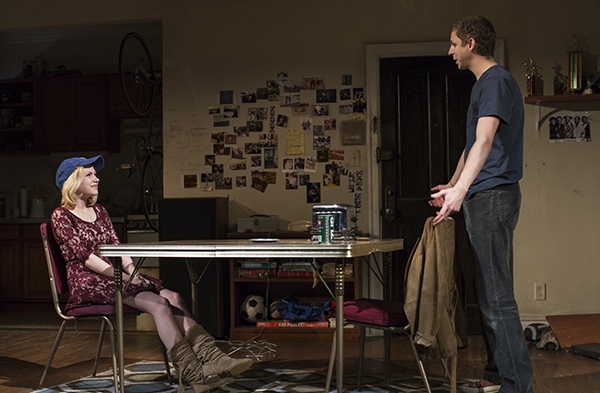Michael Cera and Kieran Culkin star in Anna D. Shapiro’s Stellar Directing Effort
Kenneth Lonergan first burst onto the theatrical scene in 1994 with an Off-Broadway production of This Is Our Youth, a scathing but ultimately touching update of Rebel Without a Cause. Like the 1955 James Dean movie classic, Youth focuses on a trio of teenagers struggling to find home and connection when the adults in their lives have let them fend for themselves. But unlike the leather-jacketed delinquents of Rebel, the youngsters here don’t even have a motorcycle gang or other misfits with whom to form a makeshift family. Given tons of cash and no guidance by their parents, these kids run wild on the Upper West Side of the early ’80s, sniffing coke, indulging in anonymous sex, and bouncing off the walls in Reagan’s heartless American.
Nearly 20 years after its premiere, director Anna D. Shapiro has given the play a shot of adrenaline and a warm beating heart with Kieran Culkin and Michael Cera contributing mightily to both. The play opens in the squalid studio apartment of Dennis Ziegler (the electric Culkin), an arrogant alpha male who supplements his earnings as a bike messenger by dealing drugs to his fellow slackers. (The apartment is paid for by his parents, a famous painter and a strident social worker, to get him out of their hair.) Dennis’ quiet is disrupted by the feverish buzzing of his best friend Warren Straub (a deceptively glassy-eyed Cera), a pathetic syncophant who hero-worships him. Warren has been thrown out by his abusive father, a lingerie tycoon with crime connections. But before he left, Warren boosted $15,000 from Pop. How that money gets spent and the duo’s wacko plans to return it over a desultory 48 hours make up the action of the play.

But the loose plot is not really the driving force of this insightful character study. It’s the push-pull, love-hate bond between Dennis and Warren. The two are like battling siblings with Dennis bullying and berating the younger, attention-hungry Warren who accepts his taunts and begs for more. They act like unruly, squabbling children, but there is a sort of love between them born of their rejection by self-centered parents. (The unseen adults are a subtle metaphor for the ego-driven larger society which has continued to be just as narcissistic.) The third character is Jessica Goldman, an equally alienated fashion student and Warren’s not-so-secret crush. Lonergan does give Jessica depth and her own objectives, but she’s secondary to the two main characters. Unfortunately, website whiz kid Tavi Gevinson in her stage debut, plays her on a limited scale of notes from jittery insecurity to petulant anger.
Culkin and Cera are the main attraction here. Culkin manages to make the arrogant Dennis charming, even likable. It’s easy to see why he attracts a ring of followers like Warren even as he berates them. (His scalding monologue over the phone to an overweight fellow dealer is a riot.) Cera’s Warren is an amazingly multi-layered portrait of a lost kid who’s been beaten up psychologically and physically. At first, Warren seems like a laughable, infantile loser, tossing a football around and lovingly caring for the vintage toys he drags around in a cumbersome suitcase. But gradually, Cera reveals the guy’s piercing intelligence which gives him insights into his dysfunctional world. The play ends with Dennis and Warren surrounded by the wreckage of their aimless weekend, commiserating over their broken homes. Hysterically funny and heart-breakingly sad, this is anything but a wasted Youth.
Now—Jan. 4, 2015. Cort Theatre, 138 W. 48th St., NYC. Mon.—Tue., Thu., 7 p.m.; Fri., 8 p.m.; Sat., 2 and 8 p.m.; Sun., 2 and 8 p.m. Running time: two hours and 30 mins. including intermission. $85-$135. (212) 239-6200 or www.telecharge.com.
